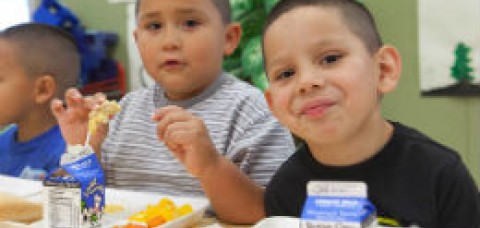Race to the Top – Early Learning Challenge
The Race to the Top-Early Learning Challenge (RTT-ELC) program aims to improve the quality of early learning and development and close the achievement gap for children with high needs. RTT-ELC grants focus on improving early learning and development programs for young children by supporting each State's efforts to:
- Increase the number and percentage of low-income and disadvantaged children in each age group of infants, toddlers, and preschoolers who are enrolled in high-quality early learning programs;
- Design and implement an integrated system of high-quality early learning programs and services; and
- Ensure that any use of assessments conforms with the recommendations of the National Research Council's reports on early childhood.
RTT-ELC focuses on five key areas of reform:
- Establishing Successful State Systems by building on the State's existing strengths, ambitiously moving forward the State's early learning and development agenda, and carefully coordinating programs across agencies to ensure consistency and sustainability beyond the grant;
- Defining High-Quality, Accountable Programs by creating a common tiered quality rating and improvement system that is used across the State to evaluate and improve program performance and to inform families about program quality;
- Promoting Early Learning and Development Outcomes for Children to develop common standards within the State and assessments that measure child outcomes, address behavioral and health needs, and inform, engage and support families;
- Supporting a Great Early Childhood Education Workforce by providing professional development, career advancement opportunities, appropriate compensation, and a common set of standards for workforce knowledge and competencies; and
- Measuring Outcomes and Progress so that data can be used to inform early learning instruction and services and to assess whether children are entering kindergarten ready to succeed in elementary school.
RTT-ELC Highlights
ACF's Office of Early Childhood Development works closely with the Department of Education’s Office of Early Learning to guide and oversee the work of these RTT-ELC States. Currently, there are 20 States, divided into three (3) groups based on year of award, participating in the RTT-ELC Program.
Phase 1
On December 11, 2011, the White House announced the Phase 1 group of recipients of the RTT-ELC grant and they were: 1) California, 2) Delaware, 3) Maryland, 4) Massachusetts, 5) Minnesota, 6) North Carolina, 7) Ohio, 8) Rhode Island, and 9) Washington.
- 2013 Annual Performance Reports
- 2014 RTT-ELC Year Two Progress Report is a summary report providing information about the progress of the 14 Phase 1 and Phase 2 States.
- 2014 Annual Performance Reports
- 2015 RTT-ELC Year Three Progress Report is a summary report providing information about the progress in 20 states in Phase 1, Phase 2 and Phase 3
- 2016 RTT-ELC Year Three Progress Report is a summary report providing information about the progress in 20 states in Phase 1, Phase 2 and Phase 3
Phase 2
On April 9, 2012, the Departments of Education and Health & Human Services announced the Phase 2 group of recipients and they were: 1) Colorado, 2) Illinois, 3) New Mexico, 4) Oregon, and 5) Wisconsin.
- 2013 Annual Performance Reports
- 2014 RTT-ELC Year Two Progress Report is a summary report providing information about the progress of the 14 Phase 1 and Phase 2 States.
- 2014 Annual Performance Reports
- 2015 RTT-ELC Year Three Progress Report is a summary report providing information about the progress in 20 states in Phase 1, Phase 2 and Phase 3
- 2016 RTT-ELC Year Three Progress Report is a summary report providing information about the progress in 20 states in Phase 1, Phase 2 and Phase 3
Phase 3
On December 19, 2013, the Departments of Education and Health & Human Services announced the Phase 3 group of recipients and they were: 1) Georgia, 2) Kentucky, 3) Michigan, 4) New Jersey, 5) Pennsylvania, and 6) Vermont.
- 2014 Annual Performance Reports
- 2015 RTT-ELC Year Three Progress Report is a summary report providing information about the progress in 20 states in Phase 1, Phase 2 and Phase 3
- 2016 RTT-ELC Year Three Progress Report is a summary report providing information about the progress in 20 states in Phase 1, Phase 2 and Phase 3
Additional Resources
- RTT-ELC Technical Assistance
- RTT-ELC 50 State Strategy
- Quality Rating and Improvement Systems (QRIS) in RTT-ELC
- Workforce Initiatives in RTT-ELC
- Key Implementation Themes in Phase 1 RTT-ELC Grantee Performance Reports
- Legislation, Policies & Regulations
HHS Policy Advisors assigned to RTT-ELC
Ngozi Lawal
Senior Policy Analyst for Early Childhood Development and Education
U.S. Department of Health and Human Services
Administration for Children and Families
Switzer Building
330 C Street, SW, 4th Floor
Washington, DC 20201
Phone: (202) 260-5943
Fax: (202) 205-4891
Email: ngozi.lawal@acf.hhs.gov
Marsha Basloe
Senior Advisor for Early Childhood Development and Education
Administration for Children and Families
Office of the Deputy Assistant Secretary for Early Childhood Development
Switzer Building
330 C Street, SW, 4th Floor West
Washington, D.C. 20201
Phone: (202) 401-7241
Email: marsha.basloe@acf.hhs.gov
Richard Gonzales
Senior Advisor for Early Childhood Development and Education
Administration for Children and Families
Office of the Deputy Assistant Secretary for Early Childhood Development
Switzer Building
330 C Street, SW, 4th Floor
Washington, D.C. 20201
Phone: (202) 401-5138
Email: richard.gonzales@acf.hhs.gov


